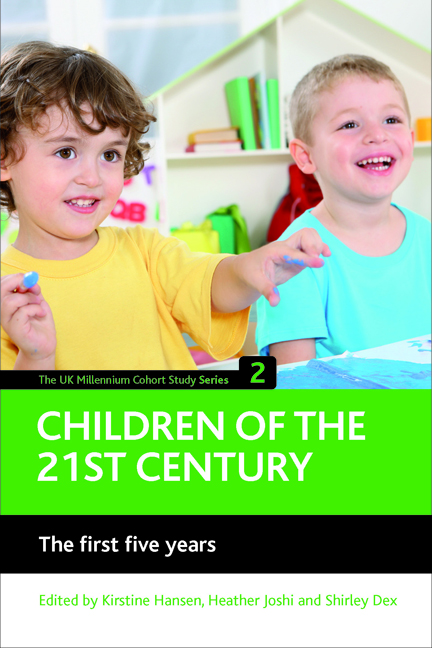Book contents
- Frontmatter
- Contents
- Acknowledgements
- List of contributors
- Glossary
- one Introduction
- two Child poverty in the first five years of life
- three Ethnicity, community and social capital
- four Parental relationships and parenting
- five Partnership trajectories, parent and child well-being
- six Employment trajectories and ethnic diversity
- seven Neighbourhoods and residential mobility
- eight Childcare in the pre-school years
- nine Intergenerational inequality in Early Years assessments
- ten Ethnic inequalities in child outcomes
- eleven School choice
- twelve Teacher assessments in the first year of school
- thirteen Childhood overweight and obesity
- fourteen Resilience in children's development
- fifteen Parental and child health
- sixteen Conclusions
- References
fourteen - Resilience in children's development
Published online by Cambridge University Press: 01 September 2022
- Frontmatter
- Contents
- Acknowledgements
- List of contributors
- Glossary
- one Introduction
- two Child poverty in the first five years of life
- three Ethnicity, community and social capital
- four Parental relationships and parenting
- five Partnership trajectories, parent and child well-being
- six Employment trajectories and ethnic diversity
- seven Neighbourhoods and residential mobility
- eight Childcare in the pre-school years
- nine Intergenerational inequality in Early Years assessments
- ten Ethnic inequalities in child outcomes
- eleven School choice
- twelve Teacher assessments in the first year of school
- thirteen Childhood overweight and obesity
- fourteen Resilience in children's development
- fifteen Parental and child health
- sixteen Conclusions
- References
Summary
Introduction
The aim of this chapter is to assess early childhood influences on the cognitive and behavioural development of children in the Millennium Cohort Study (MCS) at age 5. In particular we consider the role potential protective factors in the family environment may play and whether they can ameliorate some of the disadvantages known to influence children's development, such as family financial hardship.
The association between limited family material resources and poor child and adolescent development is well documented (Duncan and Brooks-Gunn, 1997; Bradley and Corwyn, 2002; Engle and Black, 2008). Children growing up in circumstances characterised by socioeconomic disadvantage are at greater risk of developing cognitive and behavioural adjustment problems during childhood, which in turn have consistently been found to influence later outcomes regarding education, employment, health and social integration (Rutter and Madge, 1976; Essen and Wedge, 1978; Duncan and Brooks-Gunn, 1997; Schoon, 2006). Persisting social inequalities in children's behaviour and development are of ongoing concern for policy makers and social scientists, as indicated, for example, in the Every Child Matters framework (HM Treasury, 2003) and The Children's Plan (DCSF, 2007).
The UK has been identified as a highly privileged country, according to the United Nations (UN) Human Development Index, measured in terms of longevity, knowledge and income (UNDP, 2001). Nonetheless about one million British children (8%) were living in severe poverty at the turn of the millennium (ie poor on three possible counts, Adelman et al, 2003). 21% of children lived in households with an equivalised household income (before housing costs [BHC]) below 60% of the median (DWP, 2003). A report by the UN suggests that poverty rates for children in the UK were several times higher than those in most Western industrialised countries (UNICEF, 2007), although the situation appears to have improved since then (OECD, 2008). Given the persistence of poverty even in highly developed countries it is essential (a) to develop strategies to reduce poverty in the first place, and (b) to learn more about the impact of material hardship on children's early development, and to identify factors that enable successful development in the face of adversity.
- Type
- Chapter
- Information
- Children of the 21st century (Volume 2)The First Five Years, pp. 235 - 248Publisher: Bristol University PressPrint publication year: 2010

